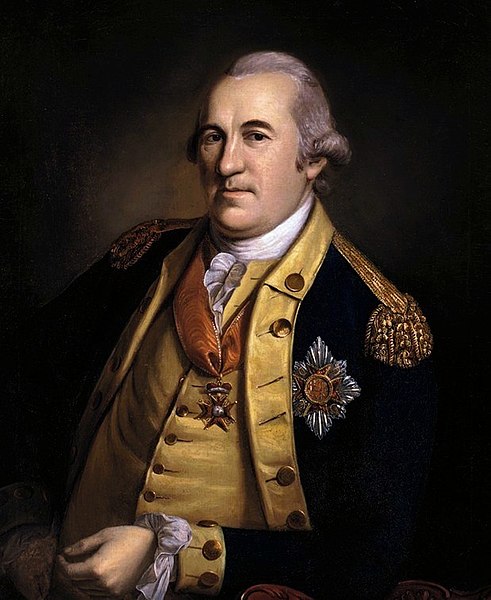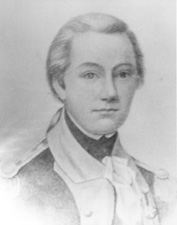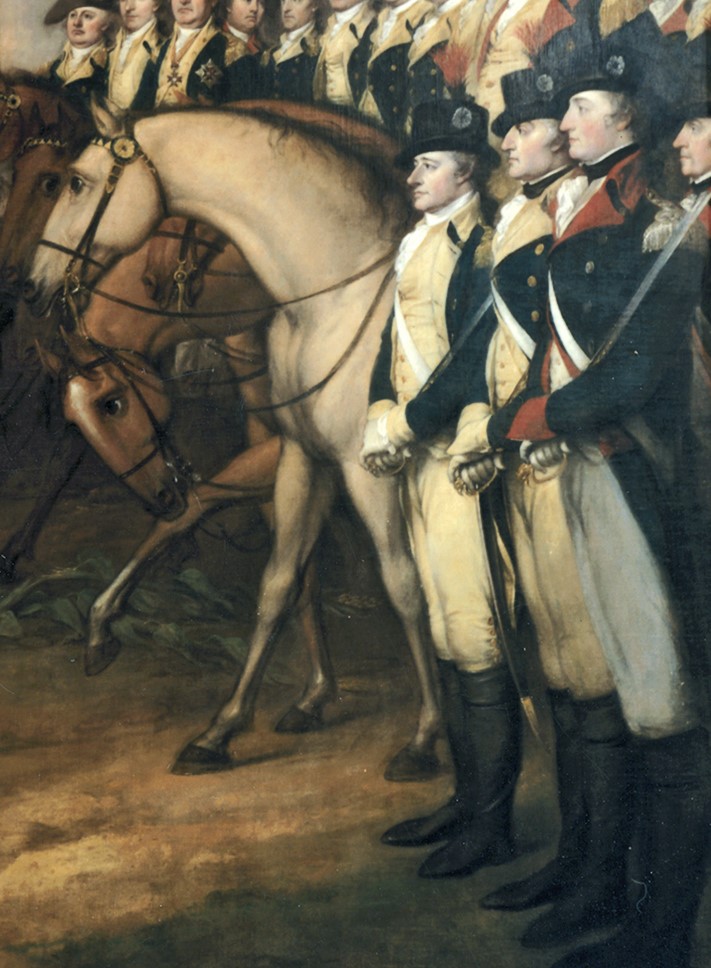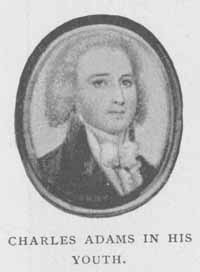Baron von Steuben’s Family
In 1777, Baron Friedrich Wilhelm Ludolf Gerhard Augustin von Steuben arrived in America to help save the new nation from certain defeat. Steuben was soon named Inspector General, a position in which he not only taught the amateur army some much needed discipline, but organized the swarming multitude of details the army had been unable to get under control, such as the sizes of units and the supplies for each soldier. Unbeknownst to most of his colleagues, Steuben’s ability to pull chaos together extended into his personal life. From amongst a society that viewed same-sex attraction as a moral defect, Steuben plucked young LGBT+ men who needed guidance and somewhere to belong, and gave them a family.

Steuben
In order to tell the story of Steuben’s family it is necessary to start with Steuben himself. There is no evidence of Steuben ever having a romantic or sexual relationship with a woman. The only thing that has ever been pointed to is a story in which a small portrait of a woman fell out of Steuben’s bag while he was traveling. When a friend, John W. Mulligan, asked who the woman was, Steuben is said to have replied “O, she was a matchless woman!” That Steuben had great respect for a woman does not prove a sexual or romantic relationship. Additionally, this story was told by Mulligan many years after Steuben’s death, and was likely created in order to boost Steuben’s reputation.¹
Steuben’s reputation needed this boost because even during his lifetime there were rumors he was homosexual. Suspicions around his sexual orientation drove him from Prussia to France, and eventually from France to America.² These rumors continued to appear from time to time in America, from opponents in the military and later in politics.³ Steuben may have even been suggesting that Congress knew (and was unhappy about) the reason Steuben remained unmarried when he told his friends that Congress did not want to reward “an old bachelor.”⁴ In spite of any damage it may have done to his career or life, Steuben never refuted the rumor, perhaps because he knew he would not have been able to. Steuben found himself living as an out gay man in the late seventeen hundreds, and with no choice but the go with it, Steuben was able to live a relatively open life liberated, to some extent, from shame.
Benjamin Walker and William North
When Steuben arrived at the Continental Army’s camp, even before being formally named Inspector General, he immediately got to work. The Continental Army was thrown together, the work of a few veteran soldiers, but mostly of civilians, people who had patriotic fervor but little experience or military expertise. Steuben had been in military life since he was fourteen, and had all of the knowledge and experience the Americans needed.⁵ In order to make the Continentals into a proper army, however, Steuben needed help, especially as he spoke Prussian and French but no English. Benjamin Walker joined Steuben’s family (the word commonly used to refer to a general’s staff) early on, after coming to Steuben’s rescue one day during drilling when neither Steuben nor his assistant knew the English necessary to communicate to the troops what they wanted them to do.⁶ Walker would stay with Steuben for much of the rest of the war, and even after he left Steuben’s staff for Washington’s, Walker was seen as a direct link to the Baron.⁷ Steuben and Walker grew close, and according to historian William E. Benemann, there was always “An element of flirtation in Von Steuben’s letters.”⁸ Benemann also said that Walker was all too willing to exploit Steuben’s attraction to him to get favors.⁹ This assertion likely contains some truth, as Walker did frequently write to Steuben while on Washington’s staff asking Steuben to buy him things. That being said, Steuben was very sensitive to slights, and the fact that he remained close with Walker indicates that the aide never pushed things too far.¹⁰

William North joined Steuben’s staff after Walker, though North and Steuben had actually met years before. They met for the first time at a ball held in Steuben’s honor shortly after the Baron arrived in America. North was struck by Steuben, and described his general manner as “graceful”.¹¹ In 1779, North joined Steuben’s family. North greatly respected the Baron but was unafraid to be honest with him when he thought Steuben was making a mistake, and this in turn won Steuben’s respect.¹² North and Steuben grew close, perhaps closer than Steuben had been with Walker. Their letters show some level of romance, and hint that their relationship could have included sex as well.¹³ Despite this, Steuben was not the center of North’s romantic life, at least at that time. Not long after joining Steuben’s family, North developed feelings for another aide-de-camp, James Farlie.¹⁴ How long North and Farlie’s relationship lasted, or how serious it was, is uncertain, but North was surprised when he realized he no longer had feelings for Farlie. Who had won North’s heart? Benjamin Walker. North later explained this transition to Walker, telling him “When I began to love you, I know not…the first motion of disregard to Farlie I remember -t’was at Tappan -I lay on straw with one blanket.”¹⁵ North and Walker, it can be said with some certainty, fell in love, as their letters were always more romantic than was common even in an era which celebrated affection between men.¹⁶
Though Steuben worked at a furious pace, his military household was a comfortable, enjoyable environment. Once on Washington’s staff Walker would complain to Steuben about how he missed the amusement and the generally cheerful air which he had grown used to with Steuben.¹⁷ Having been made a major general, Steuben received more rations than the average soldier, and he knew how to trade the extra food for small luxuries soldiers got a hold of.¹⁸ Steuben could then use these acquired supplies to throw modest parties in the house he had been allowed the use of as his headquarters. One party in particular stands out: at Steuben’s command “His aides invited a number of young officers to dine at [Steuben’s] quarters…on condition that none should be admitted, that had on a whole pair of breeches,” according to Steuben’s secretary.¹⁹ This story highlights one of the things Steuben’s family loved most about life in his household: they all knew they could be open about their sexualities. While at times the romantic dynamic between Walker, North and Steuben can seem confusing, the fact that they felt they could flirt with one another means they did all know that the others were not straight, or at the very least that the others were not homophobic. Flirting with one another and enjoying wildly homoerotic parties, Steuben and his family could forget that many in their society were hostile towards them, and could escape any shame they may have felt.
Alexander Hamilton and John Laurens

(Hamilton is next to the horse, Laurens is the very next man.)
Though a general’s staff was called a family, Steuben’s true family extended beyond his aides de camp. Alexander Hamilton and John Laurens were on Washington’s staff when they met Steuben, and Washington assigned them to assist Steuben at several points throughout the war, chiefly because they spoke French. Hamilton and Laurens quickly became good friends with the Baron. Laurens was one of Steuben’s biggest fans, and constantly wrote to his father praising Steuben, in one letter telling Henry Laurens “All the Gen Officers who have seen him are prepossessed in his favor and conceive highly of his abilities.”²⁰ Hamilton adored Steuben too, and Steuben was later present at the simultaneous baptism of several of Hamilton’s children.²¹ The three had much in common: they all loved military service and Enlightenment philosophy, and they all had endless opinions on politics.²² Addiotnally, niether Hamilton, Laurens, nor Steuben was heterosexual. Since Steuben appears to have been unashamed of his sexuality, and as biographer Paul Lockhart stated that Steuben felt he “could relax in [Hamilton and Laurens’s] presence,” it is possible that Steuben may not have hidden his sexuality from them.²³ It is just as likely that, as a gay man himself, Steuben would not have been oblivious to the romance developing between his two friends.
Ten years after Laurens’s death, Hamilton encountered another young couple trying to love each other while surrounded by homophobia. Hamilton introduced these two men to Steuben, who consequently took them into his home and became a mentor and a father to them both. That Hamilton knew Steuben would do this for them may indicate that Steuben served a similar role for him and Laurens years before. Laurens struggled his whole life with his sexuality, and was likely scared and anxious about the growing feelings he had for his friend.²⁴ Hamilton appears to have been more at ease with the idea of attraction between men, but Hamilton struggled to really open his heart to anyone, male or female.²⁵ Steuben knew both of these struggles well, and likely shared his wisdom with his young friends.
Charles Adams and John W. Mulligan

The young couple Hamilton encountered was Charles Adams and John W. Mulligan. The war had been over for nearly ten years, and Steuben was now living in New York on land he had been given as a reward for his service. Adams and Mulligan were law clerks. They had both started their time as clerks in the law office of Alexander Hamilton, and it was there that they met and fell in love.²⁶ At some point the two clerks moved in together.²⁷ When Hamilton became secretary of the treasury about six months after Adams and Mulligan had begun working for him, they were forced to find other law offices, but they continued to live together. As time went by, Adams’s father, vice president John Adams, began to become suspicious of the true nature of the relationship between Mulligan and his son. John Adams insisted that Adams and Mulligan stop living together and stop spending time together.²⁸ The two lovers were devastated, and began searching desperately for a solution to their situation. They ended up with Steuben. But how? In the letter where Steuben invites the two men to live with him, he mentions that Mulligan’s letter was “handed to me by Mr. Hamilton.”²⁹ It seems that in their hour of need the two clerks turned to their former employer, Alexander Hamilton. Their doing so may be explained by the fact that it is possible they knew Hamilton was bisexual. In a letter years later Charles Adams mentioned being at a dinner with Hamilton where Hamilton’s nephew jokingly accused him of having “weaknesses not confined to the female sex.”³⁰ Though this was meant as a light joke, it apparently caught Adams’s attention, as he reported that it “perhaps was not thought of by any person but myself afterwards.” Other elements of the letter suggest that this may not have been the first time Adams had these suspicions about Hamilton.
And so, when faced with John Adams’s attempt to break up their relationship, Adams and Mulligan turned to Hamilton for help. Hamilton in turn put them in touch with Steuben, and they corresponded for a time before Steuben eventually invited them to come live with him.³¹ Adams and Mulligan lived with Steuben for a year, at the end of which Steuben decided to move to his land upstate.³² Adams remained in the city to continue his law career, but Mulligan decided to become Steuben’s secretary, and moved upstate with him. After this Adams married, but his relationship with Mulligan did not necessarily end, as they continued to spend a lot of time together. Mulligan lived with the Baron for the rest of Steuben’s life, and was the one by Steuben’s side when he died. They both became very close to Steuben, but Steuben took Adams and Mulligan in together as his sons, not his lovers. When Steuben died Mulligan told Benjamin Walker “…my parent died!”³³
Some of the young men Steuben brought into his family may have been his lovers, some his friends, and some his sons. More likely, they were each varying combinations of these things. Ultimately though, what Steuben’s relationship was, and with who, is not the most important thing in his story. The most important thing is how, in a society that wanted anyone who was not heterosexual to believe they were alone, Steuben pieced together a community.
If you want to see more content like this, please consider supporting me by becoming my Patron. 18th Century Pride is creating LGBT+ History Content | Patreon
- http://bobarnebeck.com/mulligan.html Bob Arnebeck, “Steuben and John W. Mulligan Jr.”
- Letter to the Prince of Hechingen, quoted in http://www.homohistory.com/2014/05/friedrich-wilhelm-von-steuben-gay_24.html “Friedrich Wilhelm von Steuben Gay Revolutionary War Hero”
- “Baron von Steuben”, Bob Arnebeck
- Baron von Steuben to William North, Novemeber 15, 1786, quoted in “”To Tease and Torment”: Two Presidents Confront Suspicions of Sodomy”, Bob Arnebeck
- The Drillmaster of Valley Forge, Paul Lockhart, 8
- Ibid., 107
- Male-Male Intimacy in Early America: Beyond Romantic Friendships, William E. Benemann, 105
- Ibid., 103
- Ibid.
- Lockhart, 201
- Lockhart, 73
- Ibid., 201
- Benemann, 102
- Ibid.
- William North to Benjamin Walker, quoted in The Overflowing of Friendship: Love Between Men and the Creation of the American Republic, Richard Godbeer, 139
- Benemann, 102
- Benemann, 105
- Lockhart
- https://www.history.com/news/openly-gay-revolutionary-war-hero-friedrich-von-steuben “The Revolutionary War Hero Who Was Openly Gay”, Erin Blackemore
- John Laurens to Henry Laurens, March 9, 1778, quoted in Lockhart, 83
- Alexander Hamilton, Ron Chernow, 206
- Lockhart, 77
- Ibid.
- See my earlier post “The Sexuality of John Laurens”
- See my earlier post “The Sexuality of Alexander Hamilton”
- “”To Tease and Torment”: Two Presidents Confront Suspicions of Sodomy”, Bob Arnebeck
- Queers in History, Keith Stern
- Ibid.
- Baron von Steuben to John W. Mulligan Jr., January 1793, quoted in “Steuben and John W. Mulligan Jr.”, Bob Arnebeck
- Charles Adams to John Adams, 31 January, 1799
- See 29
- Lockhart, 299
- John W. Mulligan to Benjamin Walker, quoted in “Baron von Steuben”, Bob Arnebeck
Mikayla
Wow! I never knew about Steuben. His story is so wholesome. How he takes in these men who are not accepted by society and mentors them and gives them a loving family and home. He seems like such a cool guy! I wish I had learned about him in school.
P.s. Walker seems like a bit of a gold digger. 😉 “Walker did frequently write to Steuben while on Washington’s staff asking Steuben to buy him things”
megangack
Steuben definitely should be taught more in school! Without him we likely would not have won the Revolutionary War. I fear the Steuben is frequently left out because schools can’t find a way to pretend he was straight. 🙁
Okay, so Walker was kind of a gold digger. He asked for more and more stuff as the war went on. Years later though, when Steuben had run out of money, Walker let Steuben live with him whenever Steuben needed a place to go, so Walker did sort of pay him back.
Ken
North spoke to Mulligan I believe it was around the death of Steuben refers to him sleeping with Steuben I read in one of the Steuben biographies.
megangack
That sounds interesting. What biography was it?
Alexus Stein
I haven’t read this year but, I am doing a research project on him. And I would want more information about him. I go to churubusco elementary school.
Aj
The good baron is one of my favorite Revolutionary figures, so of course I loved reading this article! Learning more about von Steuben is something I will never tire of–and I certainly learned plenty today! Thanks for the great content!